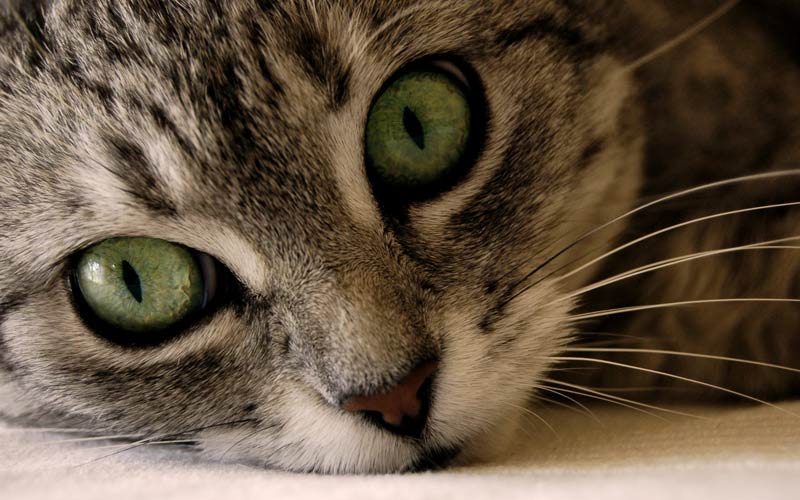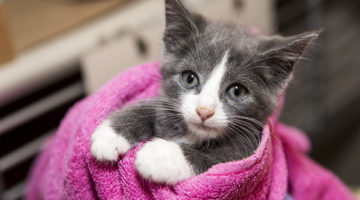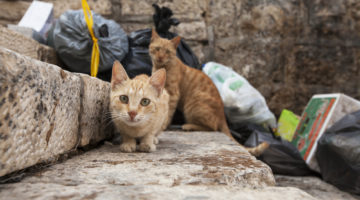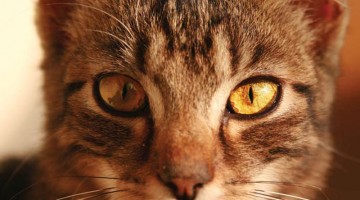Yuri loved Kira from the moment he first laid eyes on her. Then Kira was diagnosed with FIP and the decision had to be made to euthanize her. The two cats were snuggling together just before that final trip to the veterinarian. But after Kira was gone, Yuri showed no real signs of missing her.
In drastic contrast, when another two feline companions of 19 years were separated by death, the remaining cat howled for days, searched for his brother, and was so distraught he started urinating outside the litter box.
As you can see from these examples, cats express grief in very different ways. As with us, each feline personality is different, so it follows that their reactions to loss will also vary widely – from apparent indifference to extreme distress.
Signs to consider
Overt signs of grief in cats include:
• Lethargy – lack of interest in everyday activities and sleeping more than usual
• Loss of appetite
• Clinginess or, in contrast, a sense of distance
• Excessive vocalization, howling
• Searching for the lost companion
• Over-grooming
A study conducted in 1996 by the ASPCA, entitled the “Companion Animal Mourning Project”, found that 46% of cats ate less than usual after the death of a companion feline. Around 70% showed a change in vocalization patterns (they meowed significantly more or less than normal). Over half the cats became more affectionate and “clingy” with their people. Many slept more, and changed the location of where they usually slept. Overall, 65% of cats exhibited four or more behavior changes after losing a feline companion.
Even if a cat is not showing any of these signs, it doesn’t mean he isn’t experiencing grief on some level. For example, when Charlotte lost one of her cats, Nicky, she was surprised when her remaining cat Toby didn’t seem to notice, even though the two had been close. Within months, however, Toby’s health began to go downhill. He got fleas for the first time ever, then developed a fast-growing tumor that took his life less than a year after Nicky’s passing. Although there’s no way to prove it, Charlotte is convinced that Toby was actually grieving for Nicky
on such a deep level that it manifested in illness.
Give her extra TLC
Whether your cat seems to be visibly mourning or not, be sure to take steps to maintain her well being.
One …. Maintain her routine.
Two ….. Provide extra playtime and activities, such as food puzzles and clicker training.
Three… Avoid jumping in to “replace” the lost kitty companion.
Four…… Comfort your cat with the sound of your voice, and assure her you love her.
Five…… Give her extra affection if she seeks it out, but respect her need for distance.
Six ……Try using flower remedies. The Bach remedies Honeysuckle, Star of Bethlehem, and Sweet Chestnut are good choices, both for you and your cat.
Comfort in numbers
A multiple cat family may cushion the loss of a companion. There’s less competition for “resources” (i.e. your attention), but there’s also comfort to be found in the remaining family members. That’s true for us, as well: the presence of our other cats helps us with the grieving process.
As an example, writer and artist Bernadette Kazmarski had a family of nine rescue cats. The felines shared an evening ritual of gathering on the small landing outside Bernadette’s bedroom for a few pieces of food. Sadly, she lost two of her cats two weeks apart, including Kublai, the household leader. Bernadette maintained the ritual despite the losses, and so did the remaining cats, who poignantly left open spots where the missing cats had been. As the weeks went by, they slowly closed the gaps.
While multiple cat households can help soften the grief when one feline passes, this refers to homes with existing felines. If you only had two cats, and one dies, avoid the temptation to rush out and adopt another kitty to fill the void. According to Certified Cat Behavior Consultant, Pam Johnson Bennett, a grieving cat may not be emotionally ready to accept or handle a newcomer, and that the best thing to do is offer the remaining cat quality time with you, within a normal routine. She will let you know when or if it’s the right time to add another companion. In the meantime, she’ll appreciate and enjoy your undivided attention and love.
When grief becomes relief
A cat who was bullied by a dominant feline may actually see the latter’s passing as a relief. In these situations, a normally reticent feline may turn into a playful love bug. For instance, when the largest and youngest of Kendra’s trio of cats, who often fought with the other two, passed away, the remaining kitties behaved as though they had been given a new lease on life. Instead of keeping to themselves in one of the bedrooms, the way they used to, they emerged from hiding, chased each other gleefully around the house, and became much more relaxed and sociable.







No Comment